Horizons is a massively multiplayer online role-playing game in which you create a character who may then explore a dangerous world, fight monsters to gain experience levels, craft useful items, and socialize with other players. Many other games exactly fit this profile, ranging from more recent games like Final Fantasy XI and Star Wars Galaxies to older ones like EverQuest and Asheron's Call. Unfortunately, Horizons offers little that hasn't already been done--and done better--by its many predecessors. The game simply fails to distinguish itself amidst an overabundance of highly similar, more well-established competing products, and it's only really suited for those already addicted to this genre of gaming and looking for a new place for their player guilds to set up shop.
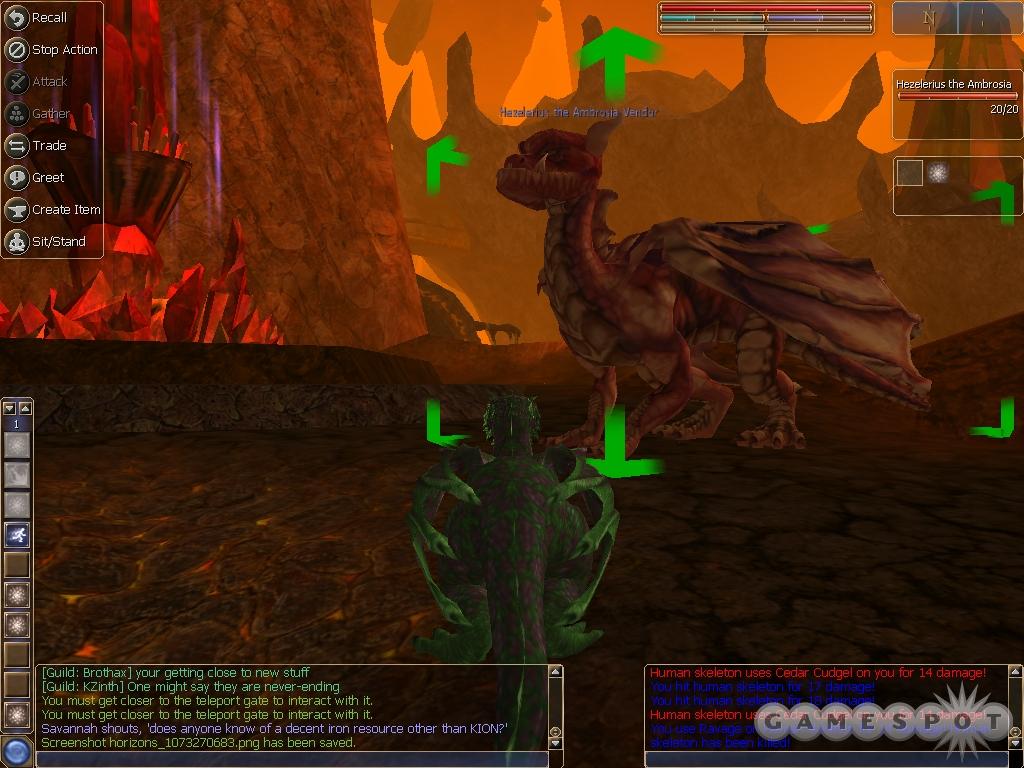
Horizons does have a few distinguishing characteristics. You may play as a dragon or as one of eight other fantasy races. Your character may simultaneously belong to an adventuring profession (such as that of the warrior or cleric) and a crafting profession (such as that of the outfitter or blacksmith), and he or she gains experience separately for these professions. The crafting system is actually rather elaborate, and it's probably the single best aspect of Horizons' gameplay. Later in a character's life, he or she may also learn more esoteric professions, such as those of the monk and the elemental archer. Adventure experience primarily comes from killing monsters, while crafting experience comes from making items. So if you get bored with the adventuring, you can turn to the crafting for a while--and vice versa.
Or, if you get bored with either of your professions, you can readily switch to another, and you can switch as often as you'd like, as opposed to having to create a new character. Dragon characters are the exception, as they are restricted to a single, generic adventure school and a single, generic crafting school. There's little downtime between battles because characters can heal up quickly if they sit tight for a couple of minutes. Additionally, magic-using characters aren't limited by their energy reserves. Each spell has a re-cast time that must elapse before the spell can be used again, but Horizons' casters need not worry about running out of mana in the middle of a fight. Furthermore, characters always have the option to teleport back to their "bind" point (that is, whichever checkpoint they last designated). Since there will be cases in which you get killed by enemy creatures, get lost out in the wilderness, or even get stuck in the geometry of the game world, this is a useful option to have on hand. The game also sports a clean, attractive, fully customizable interface, including a number of handy provisions for player guilds, like the ability to create event calendars for everyone's reference.
The core elements of the game also work well. Crafting is more involved in Horizons than in most such games, though Star Wars Galaxies has already accomplished something similar. Basically, crafting items here involves gathering the raw resources required (often by finding them out in the wilderness), then converting these raw resources into useable materials, and finally crafting these materials into finished goods. Different types of products require different tools and different machinery, and while the process for crafting any type of item is basically the same as for any other type, it's nice that crafting in Horizons is so hands-on rather than overly abstract as it is in some other games. As you gain levels in crafting, you become more efficient at the processes, thus making it so that fewer numbers of goods are required for each step. Highly experienced crafters may also use special techniques to customize their work. Interestingly, there's even an optional gambling element involved in the crafting, in how you may attempt to use fewer resources for a job at the risk of having the job fail and subsequently losing all of your materials.
At any rate, crafting in Horizons is fairly interesting overall. It can even be exciting, such as when you find a deposit of rare minerals out in the wilderness. Of course, it can be difficult to find formulas for any truly useful items, and it can take many long hours to gain the proficiency needed to craft them. There is some incentive for dedicating the time and effort, though. The game's economy is entirely player-run; monsters don't drop much of anything valuable when killed; and nonplayer "consigner" characters sell player-made equipment. This means the best craftsmen can earn some decent profit while benefiting other players with their fine goods.
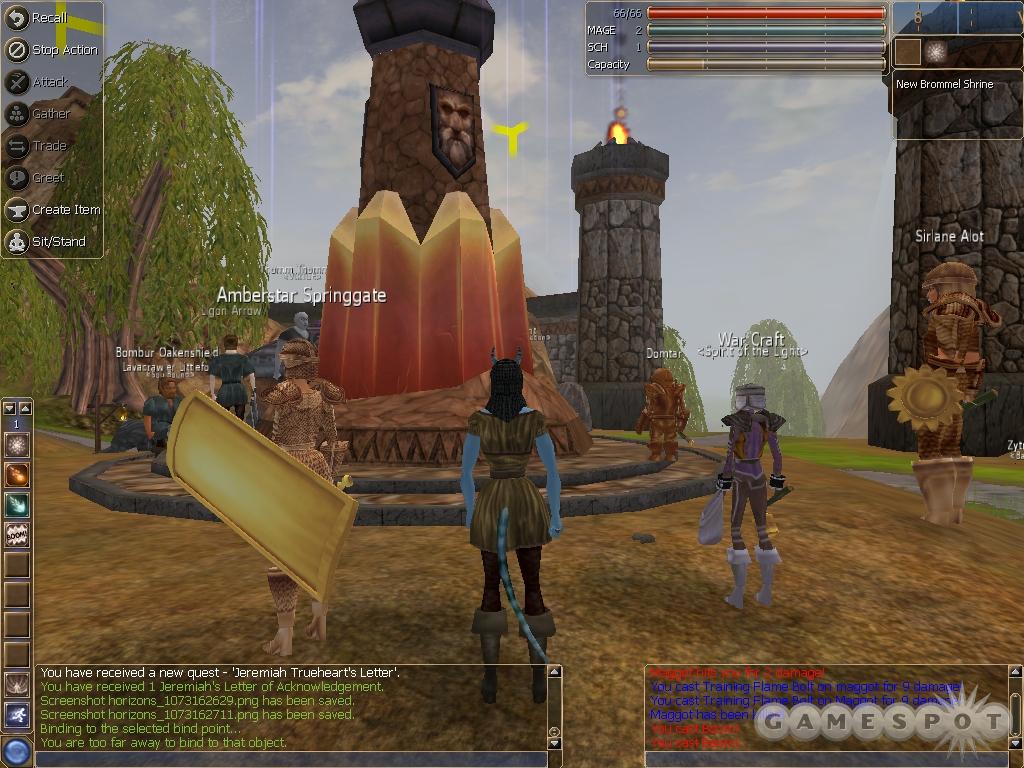
Meanwhile, initiating combat is as simple as clicking on an enemy and then toggling on attack mode. Your character will automatically close the distance before attacking his or her foe, or he or she will use ranged weapons if they're equipped. Like in other games of this type, as you gain levels in Horizons you'll gain access to various special abilities, which you can use during battle to further injure or weaken your opponent. Some of these special abilities can also be used to bolster your own powers. The game also incorporates a system of combat stances that seems really tacked-on. Three optional combat stances can be acquired, which are simply called "red," "blue," and "green" (and the default stance is "neutral). Rock-paper-scissors-style, each is stronger than one but weaker than another. So, for example, if your enemy's gone into green stance, then you should switch to red stance so that you'll do some extra damage. Assuming you have access to the stances, you can switch between them and use your other special abilities at will, but otherwise, combat is just a matter of waiting until either you or the enemy dies. The combat in the game does look pretty good (with the exception of some buggy animations that occasionally cause characters to clip through each other or jitter as though they're having seizures), and it's paced well. So, for what it's worth, the underlying process of gaining experience from defeating creatures is basically as addictive in Horizons as it is in any such game. The problem is, there's no obvious reward from doing so--besides more of the same.
Like in many other such games, you can acquire a plot of land and can build property on it in Horizons, and, to the game's credit, these features were actually implemented from the get-go. On the other hand, unlike in most other such games, Horizons has no player-versus-player component whatsoever. You can't even duel a friend just to see whose character is stronger. Other online RPGs, such as Dark Age of Camelot or Anarchy Online, which also expect you to invest dozens or even hundreds of hours into building up a respectably powerful character, have enticing player-versus-player elements where you can put that character to good use or you can at least put him or her to the test. But in Horizons, your reward for gaining an experience level tends to be maybe one new ability and some more health points so that you can then fight monsters of a slightly higher level--and then repeat. By the 10th experience level, this process will have already become highly repetitive. Beyond this point, it also becomes rather slow.
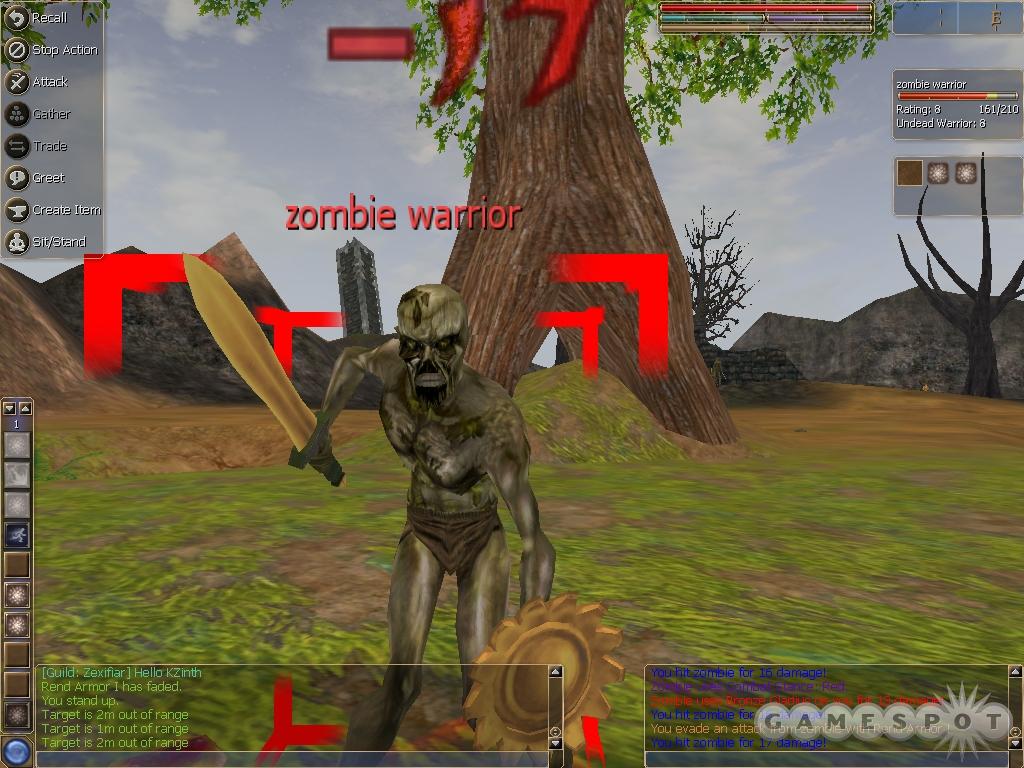
As in other games, you may group with other players to take on greater challenges than you could alone. This allows you to fight more monsters in a faster manner than usual, and you can, of course, type chat messages to pass the time, too. Unfortunately, Horizons' monsters are the same sorts of mindless things that typify this genre, and the combat is straightforward, so there aren't really any tactical benefits to fighting in a group, apart from just having more bodies to deal and soak up damage. Worse yet, there's a seriously limited variety of creatures in the game. Despite the presence of numerous starting towns, you'll invariably end up fighting the same maggots, spiders, flame beetles, and zombies over and over again. You'll eventually graduate to bigger, tougher foes, but the lack of variety in Horizons makes the inherently repetitive nature of the gameplay all the more noticeable. Some nonplayer characters will send you off on quests or will task you with killing some number of some type of creature, and these diversions can help keep you slightly more motivated, if not just busy. However, there really doesn't feel like there's enough content in the game, overall, nor is much of any of it particularly compelling. Don't expect to journey with your allies into deep, dark dungeons or to lay siege to enemy encampments or any other such epic activities. The currency or any special perks you get for solving quests will be much more rewarding than whatever congratulatory text you see onscreen.
Death is inevitable in Horizons, as it is in any online RPG. Here, your ability to reincarnate as many times as needed is justified by your character's status as one of Istaria's "gifted." Anyway, the game's penalty for dying is pretty lenient. In fact, there's no penalty at all before you reach 10th level other than an unintended trip back to your bind point. Beyond that, dying means you earn yourself a "death point" as well as a temporary penalty to any experience points you earn. Death points can be accumulated, and increase the duration and impact of the experience penalty, but they vanish one at a time in eight-hour increments (whether you're playing or not). Basically, you need to die often to really feel the sting. If you're used to losing your hard-fought levels in EverQuest, the death penalty in Horizons won't seem nearly as bad.
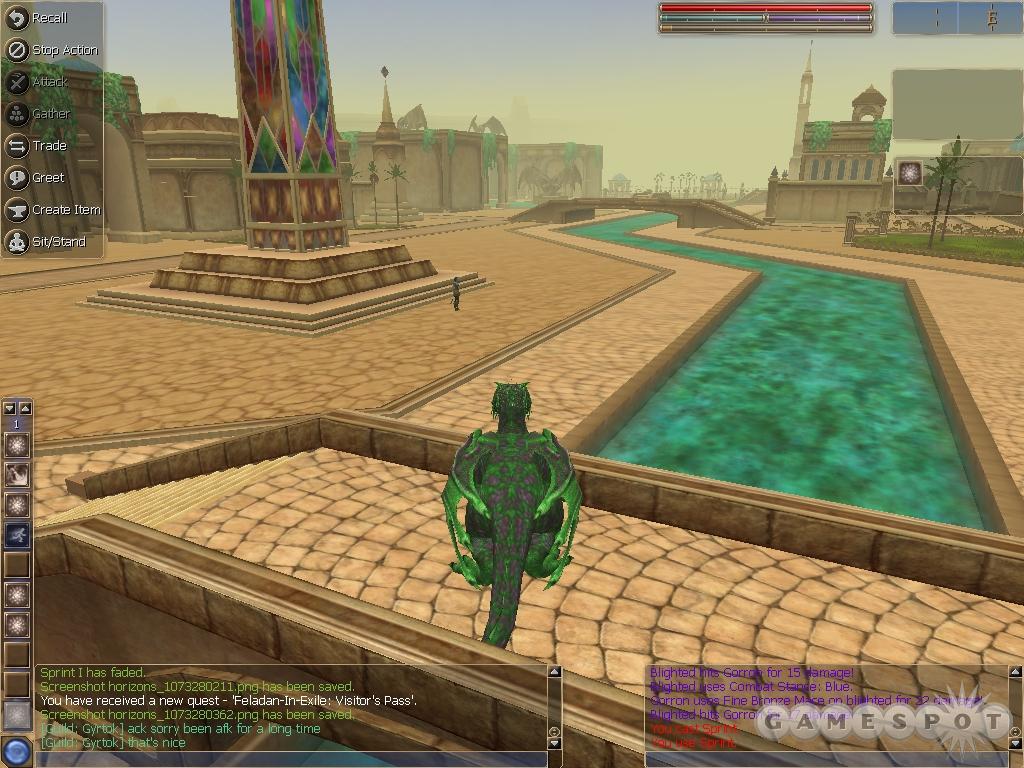
Though the ability to play as a dragon is one of the game's most highly touted features, it's really not anything special. In all fairness, no online RPGs to date have done a particularly good job of distinguishing their assorted races beyond their appearances, and Horizons is no exception. Apparently, dragon characters can eventually learn to fly, and they can mature from hatchlings to adults and finally to gigantic, ancient dragons. But, in practice, you're not going to experience anything like that happen for a long, long time, and dragons simply end up as the least interesting of Horizons' races. As mentioned, they are restricted to a single advancement path in both their adventuring and crafting professions. They run around on all fours, they get a decent flame breath attack right from the get-go, they get to throw treasure into an invisible "hoard," and they can't equip any standard weapons or armor, but overall, dragons really aren't that different from all the other races. These other races include humans, elves, dwarves, and gnomes, as well as the only-slightly-less-typical half-giants, fiends (impish looking humanoids), saris (bipedal cats), and sslik (bipedal lizards).
If the selection of races seems generic, the world of the game is much more so. Sure, there's a backstory about some encroaching evil, and you'll see pockets of pestilent land and putrid undead lurking around in it as you explore Istaria, but most of the game world is barren and bland. Most towns are nearly cookie-cutter copies of each other, and they have these embarrassingly crude and blatant signs that point you off to things like "monsters" or "non-dragon trainers." The utility of these, as well as of the clearly labeled training and crafting stations in each town, is undeniable, but they certainly aren't conducive to any sort of sense of feeling immersed in a fantastical world. The rest of Horizons' world largely consists of roadways that interconnect hilly expanses, some of which have some wandering monsters in them and some of which don't.
There are a handful of servers, or "shards," running Horizons, and apparently each can support approximately 2,000 simultaneous players, yet even the servers that are "densely" populated--according to the game--really don't feel that way. You'll see players congregating around the crafting stations in the major towns, but don't expect to see much company as you travel about or explore. The ability to instantly teleport between major locations is convenient, but it discourages exploration and undermines the illusion that Istaria is a cohesive world. For what it's worth, Istaria does offer locations that include your token deserts, tundra, oceans, lava floes, and such, but these are all predictable features of a conventional high-fantasy setting.
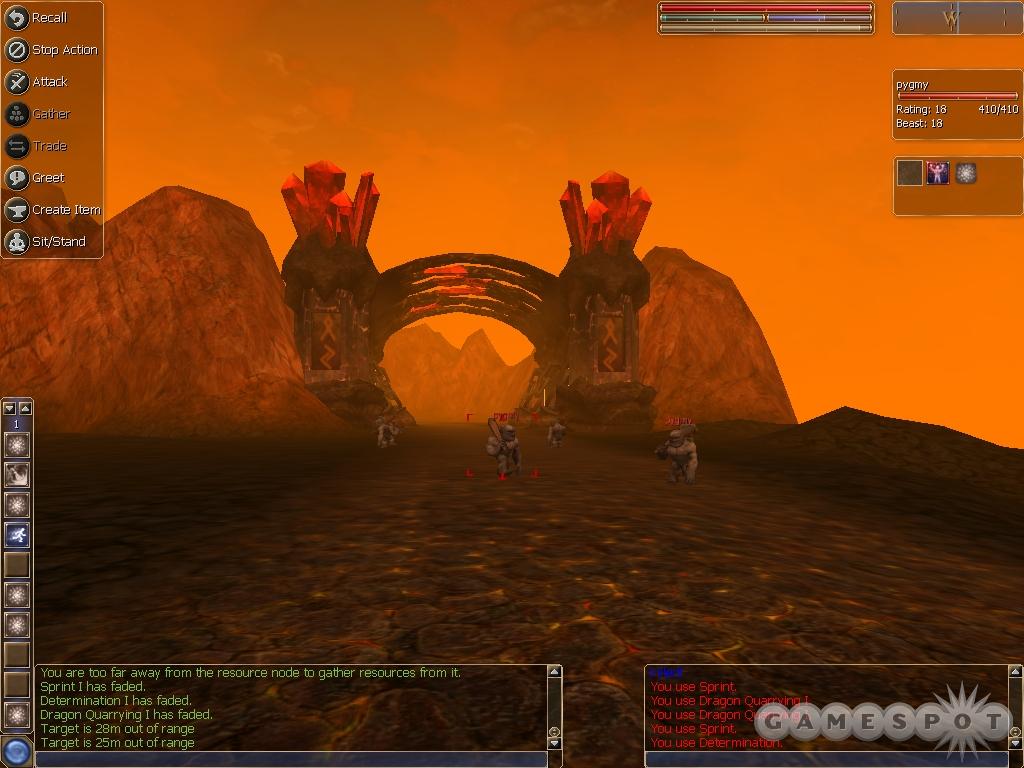
Horizons is a pretty good-looking game, but it's got some unsightly graphical issues and performance problems that undermine its visual presentation. The game will gladly hog whatever resources your system has available, so unless you've got a fast machine with lots of RAM and a high-end graphics card, expect to have to turn down most of the graphical effects. Even if you do, some areas, such as the large desert city of Tazoon, may well drive your frame rate down into the single digits, especially if other players are around. You'll also notice how the game will awkwardly construct player characters on the fly; player characters will pop onto the screen first as generic gray silhouettes, and then their specific features and equipment will gradually fill in. It's not subtle, and it detracts from the experience of the game.
The character models themselves don't look all that great either, and there seems to be a pretty limited amount of visual variety to the equipment in the game, which leads to a lot of very similar-looking characters running around. Also, very few "emote" animations are available, so don't expect to be able to dance around or do most of the other sorts of social animations that games of this type typically have in good supply. On the other hand, many of the game's environments and the textures used in these environments are detailed and attractive, as are some of the brightly colored spell effects. Some good-looking weather patterns can also be seen in Istaria, though transitions between weather effects are too abrupt. Also, you can optionally play the game in a windowed mode, which is nice. Horizons sounds more consistent than it looks and features a fitting melodic musical score that plays at particular times, such as in town or while in combat. Ambient sounds and combat sounds are minimal but well done.
There are some other issues with Horizons that are worth mentioning. The game is quite stable and seemed to launch smoothly enough when it was first released in December, though since launch, server downtimes have been fairly frequent and some noticeable bugs remain. Most annoyingly, some of our special ability hotkeys would sometimes stop working during play. Logging out and logging back in would fix this, but the game's initial loading time (and some of the loading times for teleporting between areas) lasts an inordinately long while. Gameplay can be a little laggy, which may be especially noticeable if you play as a magic-using character, as he or she may pause for a long while in battle (while the enemy presses the attack) only to suddenly let loose a bunch of spells in a row. And, no, that's no special ability. Some quests also wouldn't register properly, possibly due to lag. Clicking, then repeatedly clicking, on the quest dialogue would cause nothing to happen. And, as is unfortunately typical of the genre, numerous features that were planned and announced for Horizons haven't actually yet been implemented. For instance, the game was intended to have a dynamic world, in which players could fight to repel the encroaching undead borders, and a dynamic quest system, among other things--but there's no sign of these.
Additionally, the game's Web-based registration, login, and billing system, while functional, is pretty threadbare. Most notably, the setup process never really makes clear that the monthly charge after the first 30 days of play is, in fact, $12.95, which is the same as most other such games these days. Attempting to cancel your account requires you to place a phone call to a toll-free hotline. The game's flimsy printed manual doesn't mention these sorts of things, nor does it offer much guidance or detail about the actual gameplay. When you first begin play, some built-in tutorial pop-up windows basically get the job done, though.
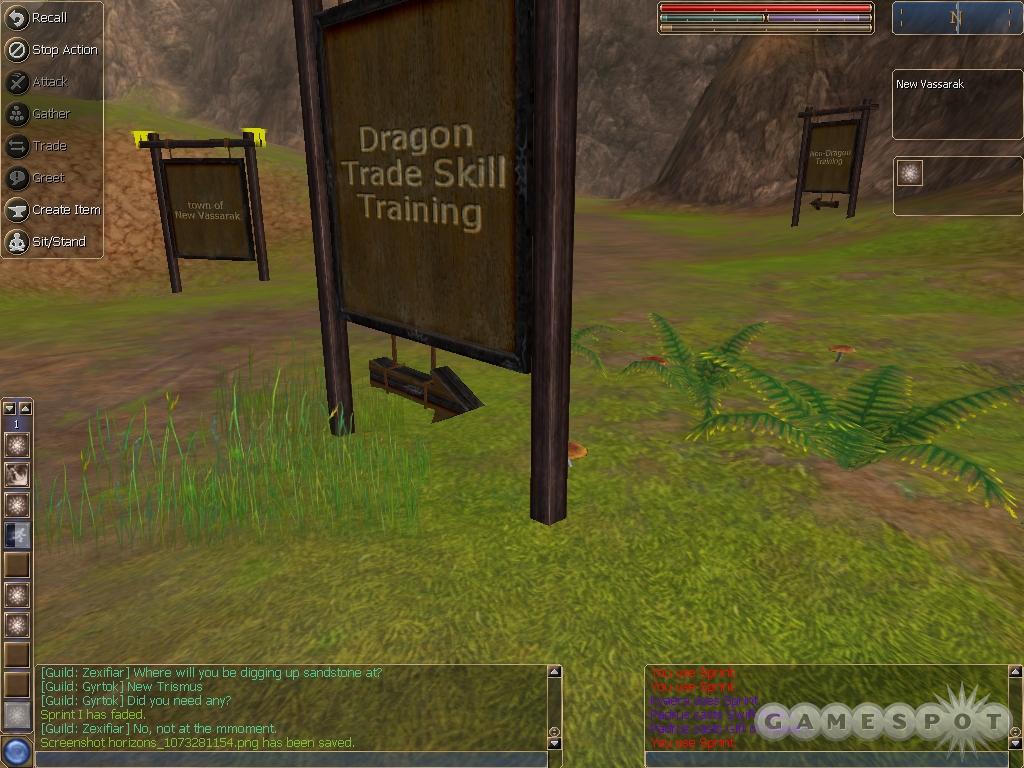
"Marginal" is an appropriate word to describe Horizons, in general, because nothing about the game really stands out or is anything more than a slight, incremental improvement over older, existing implementations of similar features. Unfortunately, in some other important respects, Horizons is seriously lacking. Sure, it's got a good, clean interface, for example, but that's not enough to draw someone away from his or her favorite online RPG when the competition offers either a more compelling world to explore or more depth of play, or both. And, like other games of this type, Horizons is overly time-consuming and is inherently not well-suited to the average gamer, so those who haven't yet taken the plunge into and accustomed themselves to paying the monthly fees for this style of gaming probably shouldn't start here and now.



